Treeplanting is a job that brings extreme mental and physical challenges, and thus great personal growth.
I spent seven summers planting trees in northern Canada, and this is what it taught me. This list is meant, in part, to help fellow treeplanters solidify into point-form lessons that vague awareness of having learned much through their experiences.
For readers who have not been treeplanters, I’ve included “explainers” at the end of some sections for unfamiliar terms. For those readers, I will briefly explain that treeplanters are paid to plant trees in blocks of land that loggers have cleared. Those trees will grow for 80 years or so before they are in turn harvested for lumber. Planters are paid per tree, so the motivation to work hard is great.
ALSO SEE: Diary of a Canadian Treeplanter: Best, Worst Job Ever
15. Bad Land Is the Rule, Not the Exception to the Rule
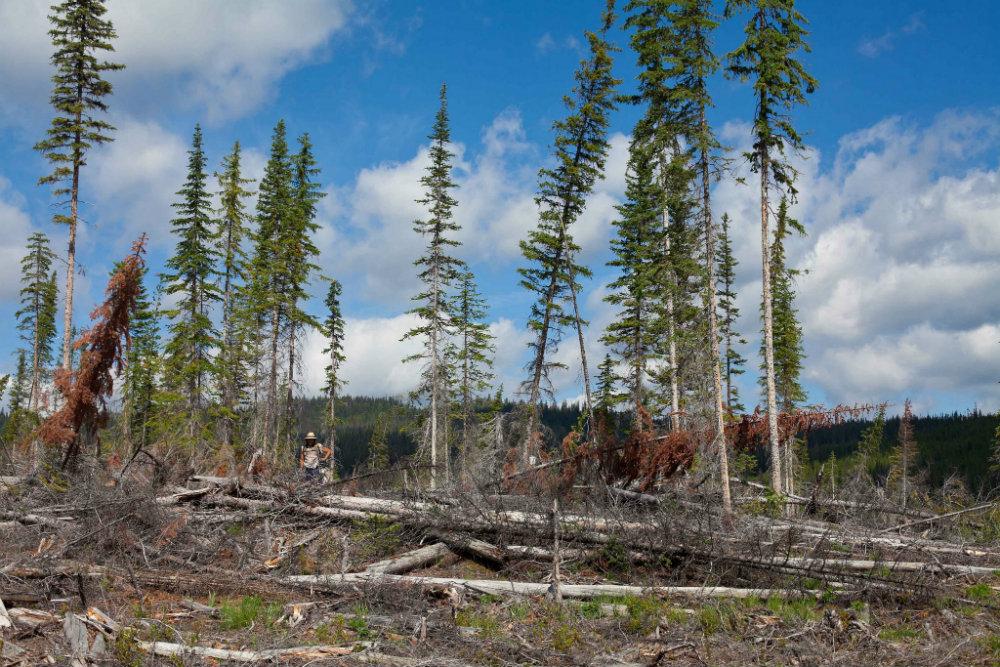
The clear-cuts reforested by treeplanters are far from clear. Here is one such clear-cut—though most of the lumber has been hauled away by loggers, plenty of fallen logs and debris is left behind for planters to crawl over and around looking for space to plant their trees. (Samira Bouaou/Epoch Times)
There are a million excuses a treeplanter can make for why he or she didn’t plant many trees that day. There are a million complaints on the tip of a treeplanter’s tongue.
Block changes, rock, slash, running out of trees at the cache, having some part of your body hurt—these are all normal elements of a treeplanting day. If you have creamy land, no pain, and uninterrupted planting, be grateful for it, but don’t expect it.
A treeplanting adage states, “There’s no such thing as bad land, there are only bad treeplanters.”
You can blame your foreman for not getting you trees or land efficiently, but you don’t know what prevented him or her from doing so. Maybe the foreman is partly to blame, but it doesn’t matter. It’s easy to complain and blame others, but that doesn’t put the trees in the ground.
You‘ll be grateful for the obstacles in a weird way when you look back on your season. If it were all easy, you wouldn’t feel you’d accomplished anything.
Everyday life application: Be grateful for the good things you have, but don’t be upset when you don’t have them. Hardship is part of life. A life free of obstacles is boring. You cherish most what’s hard-won.
Take responsibility. It’s easy to complain and blame others, but that doesn’t accomplish anything, it only creates discord and dissatisfaction.
Explainer: Slash refers to the logs, sticks, and plethora of debris that can be left on the area of land known as “the block” after the biggest logs have been hauled off by loggers. The cache is a pile of tree boxes left for each treeplanter to keep filling bags worn around the waist that the planter carries the trees in.
14. Rainy Day Blues: You’ve Seen Worse

A foggy day on a cut-block in British Columbia, Canada, where loggers have cleared the land and treeplanters have come in to reforest. (Samira Bouaou/Epoch Times)
Through rain, hail, and even snow, every treeplanter will have one day in his or her career that sets the bar as the most uncomfortable day ever.
Once that bar is set, it makes all the rain days thereafter easier to bear.
A treeplanter once told me: “Pain is weakness leaving the body.”
Everyday life application: You’ve made it through the toughest times in your life, you'll make it through this one whatever it is. At least this tough time isn’t as bad as that one was. And if it’s worse, well, you’ve got a new bar and the rest won’t be so bad.
13. Closing the Block: Pushing Past Your Limit
Explainer: “Closing the block” essentially means finishing the planting that needs to be done in a large plot of land assigned to a treeplanting crew of about 12 people. Once that block is closed, the crew will start work at a different location. The new location could be an hour or more away, so logistically it makes sense to finish in one location if possible, even if it means staying late one day, so the crew can go right to the new location the next day.
Sometimes at the end of the day when your feet are blistered to the point of bleeding from your new boots, that spot on your back is killing you, you’re exhausted, and it’s all you can do to make it to the 6 p.m. quitting time, your foreman will come with the news: “We’re going to close the block today, there are about 20 boxes (of about 300 trees) left and John needs help closing his massive piece (of land), that swampy slashy piece near the front. I'll need everyone to do a couple more bag-ups.”
The thing about closing the block is, not only do you have to work a couple extra hours, you have to work hard for a couple of extra hours. It’s not that you can just punch the time and check out. The work actually has to be done and the harder you work, the quicker it will be over. It’s also a team effort.
A certain amount of work needs to be done. If you don’t take a sufficient portion, it means the load is heavier on others.
In the end, you plant more trees and thus make more money.
Everyday life application: Sometimes when you’re at your limit of endurance life plops another hardship on you, but you have to push on. It’s also not enough to passively drag yourself through it. You need to pluck up heart. It’s also good to consider in many situations, “If I don’t do this, does it mean someone else will have to?”
When I’m put in a situation like this, I remember that I was able to muster the strength to close numerous blocks, and it encourages me to make similar efforts in other settings.
12. A Bad Attitude Is Like Cancer in the Crew
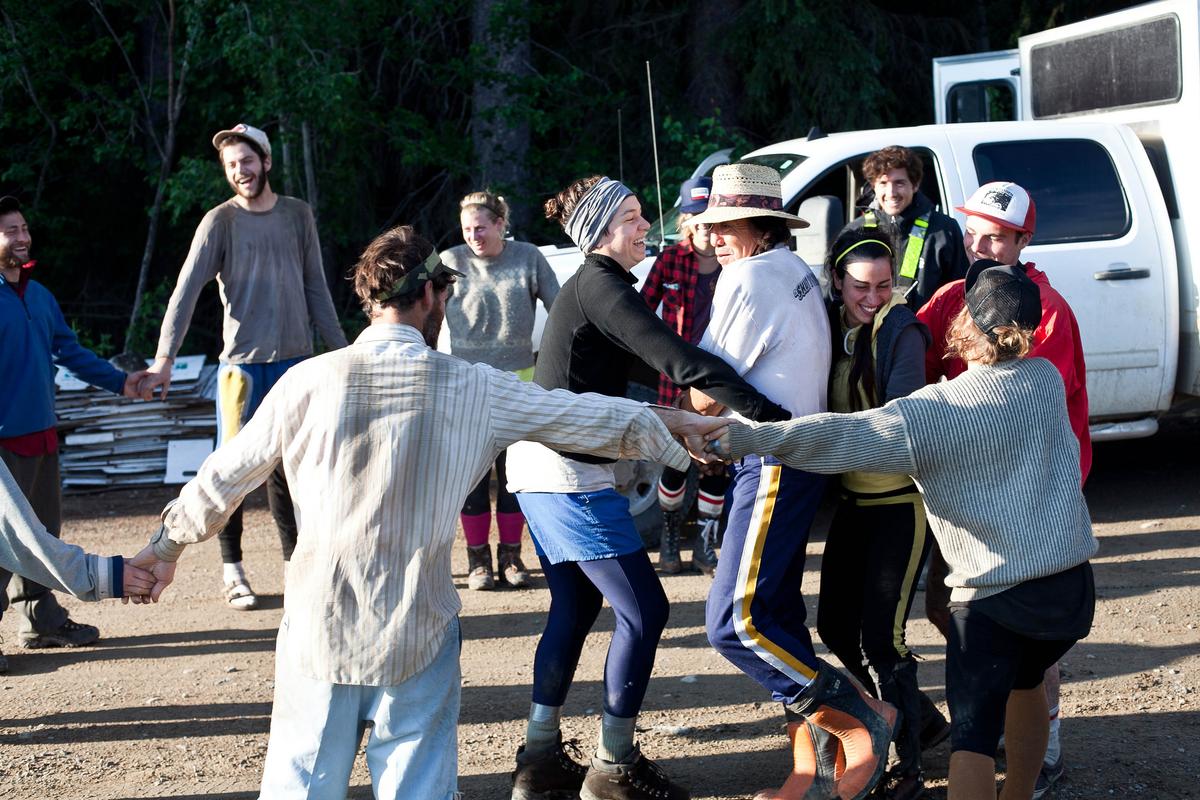
Treeplanters frolic at a morning meeting. (Samira Bouaou/Epoch Times)
Treeplanting crews become very tight-knit. You not only work together, you also travel together in close-quarters for sometimes hours a day to and from the work site. You eat together, you live in neighboring tents, you party together, you endure set-backs and hardships together. You see your crewmates at their best and at their worst.
One negative-Nancy comment in the morning can set the rest of the crew on a negative train of thought for the rest of the day. On the other hand, one motivated and optimistic worker can boost productivity and positive thinking for the whole crew.
Everyday life application: You create your environment, others are your mirror. In any team setting, one Debbie downer can poison the rest. You are a role model for somebody.
11. Every Minute Counts, Keep the Momentum
The saying “time is money” really applies when you’re being paid per tree. If you waste a few minutes here, a few minutes there, you'll have wasted an hour by the end of the day. That’s 200 to 400 trees or more, that’s $20 to $50. If you add it up over the course of a week, that could be a few hundred bucks.
Every time you stop, you have to start your motor again and wait for it to heat up.
Everyday life application: There are so many circumstances in life that require efficiency. Value your time, every minute of it, and you'll be productive.
10. Don’t Be Too Delicate With Yourself
Our bodies do have certain limits, but the vast majority of people mentally set their limits well below what they’re actually capable of. I’ve seen very tiny people and aged people plant a nearly impossible amount of trees. I’ve seen people plant with broken bones (not that I recommend that).
Take care of yourself, but don’t be too timid. You'll be surprised what you’re actually capable of!
Everyday life application: If you can do something you think at first is impossible, you'll feel great satisfaction.
9. Control Your Thoughts, Don’t Think Too Much
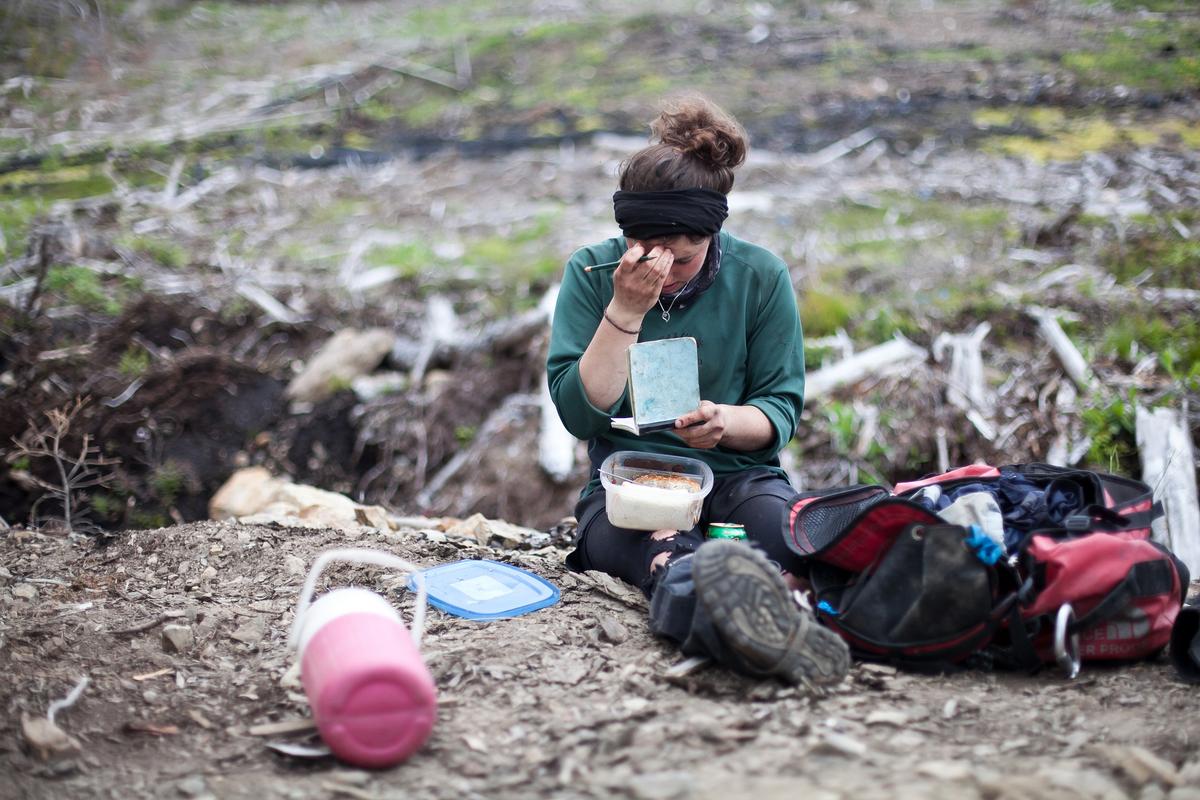
Melanie Michener tallies her trees at the end of the day. (Samira Bouaou/Epoch Times)
Just as negativity poisons a crew, your negative thoughts can poison your own mind and physically slow you down. You can either feel sorry for yourself and mull around the block planting a few trees, feeling bad at the end of the day for not having planted many, or you can pluck up and just do what needs to be done—keep putting the trees in the ground.
Just keep putting trees in the ground, don’t think too much.
When I‘d whack myself in the knee with my shovel or trip over a log, as a curse word would come to my lips, I’d turn it into a funny word.
“Oh sugar!” “Golly gee!”
Then I would laugh instead of being angry. Your words give your thoughts power and form.
Everyday life application: Don’t make things more complicated or stressful than they need to be. Just do what you need to do in an above-board manner and that’s all you can do. Even if you have negative thoughts, choosing not to put them into words can stifle them.
8. Keep Your Head in What You’re Doing, Whatever You’re Focused on Will Be Strengthened
On the days I accomplished the most treeplanting, I had singular focus. I kept thinking about how I could make my every move more efficient to plant more trees.
Probably the best planter I’ve ever met said he thinks this way all the time.
Everyday life application: Whatever you focus on is what you‘ll be strengthening. If you’re always focused on the task at hand and even thinking about how to do it better, you’ll do it very well.
7. Take Care of Others, Think of Others
It only takes one day of having forgotten your lunch (or watching a crow eat it) or having all your water leak out of the crack you didn’t notice in your water jug to really appreciate the help of your crew.
One of my crewmates really inspired me, as she would drop everything and make sure a planter had what he or she needed in these cases.
In the mess tent, don’t leave the knife submersed in peanut butter or jelly. Keep things neat. When the cooks have to clean up after you, they won’t be as happy to make yummy treats for you.
Everyday life application: Take care of others and you'll create a supportive environment that will end up naturally benefiting you in the end.
6. We Have an Idealized View of the Past
Even after multiple seasons of treeplanting, I would be surprised when I returned at how difficult it was all over again. I remembered in a vague way that there were hardships. But, for example, I thought at the beginning of one season that I'd still be able to write one article a week while I was in the bush—impossible.
Everyday life application: When you’ve overcome some hardship and you see another person going through a similar hardship, you may think you understand, but you may not actually understand. You’ve likely forgotten how hard it really is when you’re in it. This helps me have compassion for others.
5. There’s a Lot That’s Not in the Official Job Description, but It’s Part of the Job
You usually don’t get paid to move camp, unload the refer, unload garbage, and other such tasks, but they are part of the job. These are things you have to do to make the money in the bigger picture.
Everyday life application: It’s easy to fall into the mindset of “that’s not my job.” But making the business you’re in run more smoothly is generally part of your responsibility as an employee even if certain tasks aren’t in your official job description. Some may disagree on that point, but that’s what I’ve learned makes for the best work environment.
Explainer: “Unloading the refer” means taking trees out of the refrigerated unit they are stored in either at or near camp. Treeplanting camps sometimes move, and they may even move quite frequently, throughout the season to access different regions that need planting. This requires everyone to pitch in to take down and reassemble the large tent where everyone eats and many other communal structures.
4. Walk Onto Your Land Like You Own It, Don’t Let It Defeat You
A foreman once told our crew that he would watch some planters waddle onto their land with full planting bags looking like their knees were about to buckle under the weight and looking slumped over and defeated. He told us to stand up straight, carry the bags with strength and determination and take control of our piece instead of letting it defeat us.
Everyday life application: Approach everything with confidence and determination and you will succeed. Pay attention to gestures and postures that could be related to nervousness or dejectedness. Sometimes changing the outward signs can change your inner state.
3. It’s a Marathon, Not a Sprint
Start strong, but don’t destroy your body going crazy at the beginning of the season. Remember you need to push yourself hard, but you need to be as realistic as possible.
A lot of planters will say, “I was on track to plant 4,000 today, but …”
It doesn’t count if you plant 500 trees an hour for the first two hours, then drop your productivity for the rest of the day because you can’t maintain it. “I could have,” doesn’t count. All that counts is “I did.”
Everyday life application: Be honest with yourself. Determine what you can sustain for the long-haul without being too timid and making excuses for not pushing your limits. If you burn yourself out now and rest more later, you won’t accomplish any more than if you'd stayed steady all along. Sometimes you accomplish less.
2. Psyche Yourself Up, Get Excited for Challenges
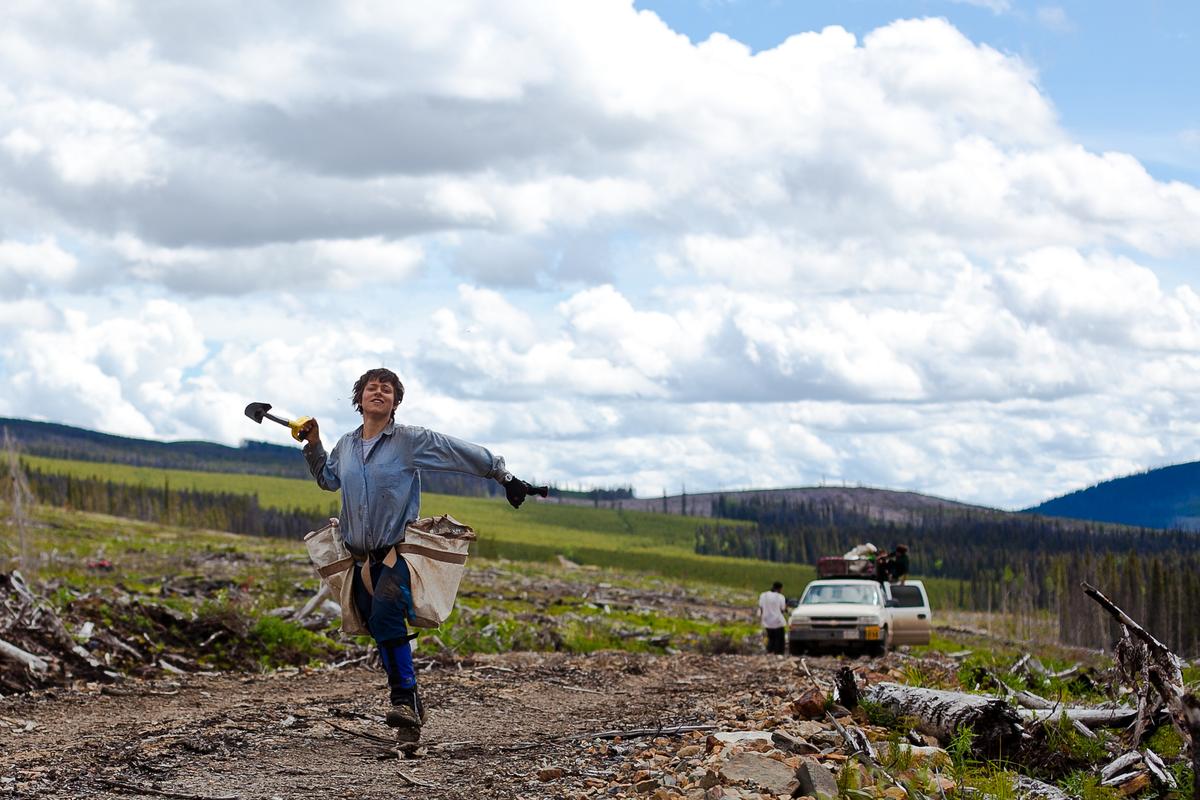
(Samira Bouaou/Epoch Times)
For my first two seasons of treeplanting, as we drove to the block in the morning I sort of dreaded our arrival and the day ahead. In my third year, I decided to really kick this sinking feeling. I would psyche myself up instead.
I'd picture how much fun it would be to get out there and put in a lot of effort and plant the trees with vigor, emerging successful. I looked forward to the challenges of my treeplanting.
It worked, and I’ve used this technique to battle fear in facing other challenges in life.
Everyday life application: If you fear something, make the effort to turn it around and picture how you can do things to emerge successful. You’re big, whatever you fear is small. You’re in control.
1. Take Care of Your Feet
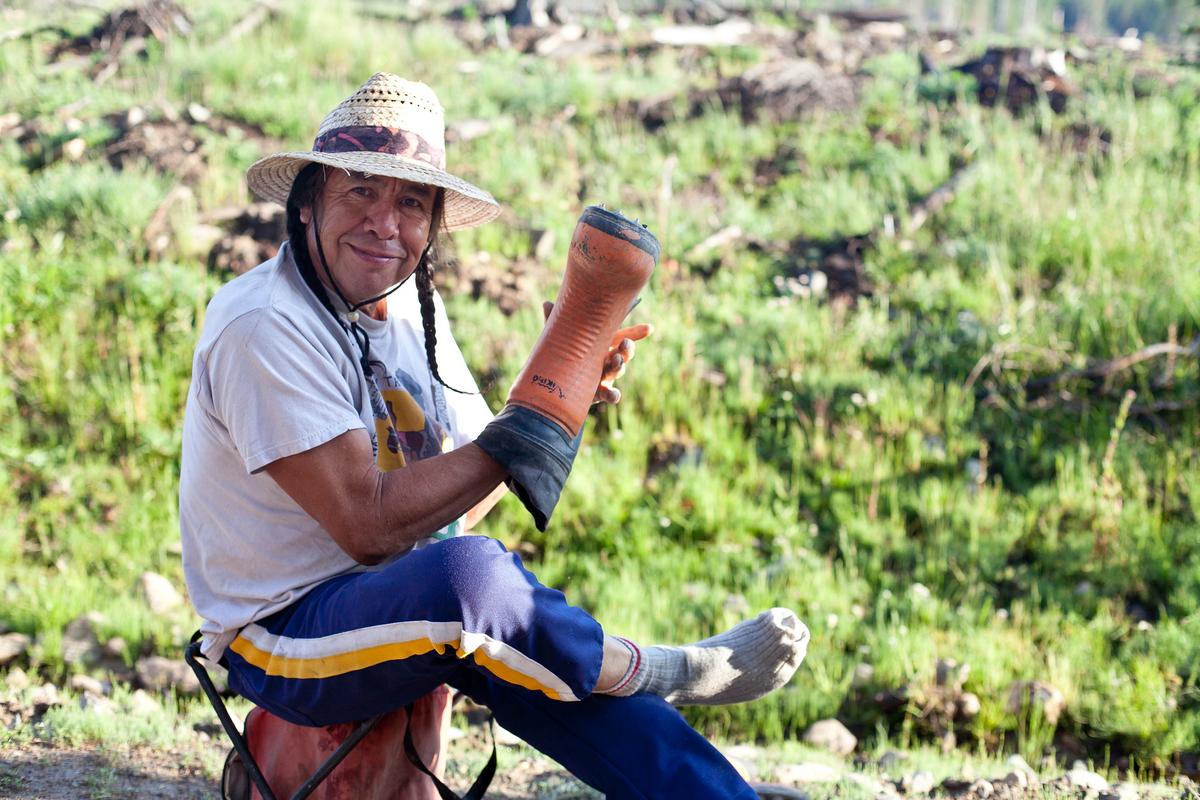
Dixon Terbasket, a treeplanter, removes his boot near a cut-block in British Columbia, Canada. (Samira Bouaou/Epoch Times)
Sometimes the littlest things can make all the difference. My first season, I had a minor case of trenchfoot from wet boots. I always advise taking off your work boots as soon as you’re back at camp, using babypowder to soak up the moisture and soothe, then putting on sandals to allow for some breathing time (fresh socks are good with the sandals if it’s too cold or there are too many mosquitoes for bare feet).
I read the Russian classic “One Day in the Life of Ivan Denisovich,” and one of the points that stuck with me was the need to maintain these little things to keep your sanity under harsh conditions.
The book chronicles life in a Siberian prison camp. Some prisoners would die under the strenuous conditions. The protagonist noted that those who survived would maintain the little civilities and rituals. They would take their hats off when they ate, for example. Those who didn’t make it would have usually stopped seeing the point in such gestures and would have let everything go.
Everyday life application: Have your morning cup of coffee and read the paper for half an hour, or wash your car on the weekend, or do whatever little thing it is you need to do to feel like you’re on top of things and have things under control when life gets busy.
If you’re a treeplanter, feel free to add any lessons you’ve learned to the comments section of this article!







